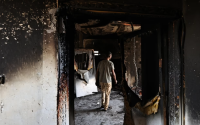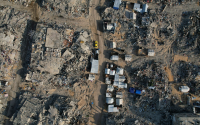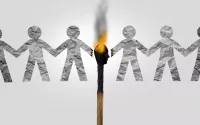3 January 2008
The murderous tribal violence that has spread through Kenya in recent days would be horrifying anywhere. It is particularly tragic to see this happening in a country that seemed finally to be on the path to a democratic and economically sound future. There may still be a chance to retrieve some of these hopes. That will likely require stepping back from the suspicious and hastily declared election results that sparked this ugly upheaval.
Officially, those results gave a second term to President Mwai Kibaki, despite independent reports of egregious irregularities. Even the chairman of Kenya's national election commission now says that he was pressured into an early declaration and cannot say who won.
Kibaki should renounce that official declaration and the embarassingly swift swearing-in that followed. He should then meet with his principal challenger, Raila Odinga, to discuss a possible vote recount, election re-run or other reasonable compromise.
That isn't likely to happen without outside prodding. Urgent mediation by the leader of the African Union, John Kufuor, could help bring the two together before the violence gets worse. Already, more than 300 Kenyans are dead, 70,000 have been driven from their homes and thousands have fled to neighboring countries.
How different things seemed five years ago. Then Kibaki, allied with Odinga, was the democratic reformer challenging Kenya's longtime autocratic leader Daniel arap Moi and his handpicked candidate. Moi's reign was repressive and notoriously corrupt. International donors grew wary and despite having some of the best agricultural land, the most attractive tourist destinations and the best urban infrastructure in East Africa, Kenya's economy stagnated.
Kibaki promised change and won in what was the freest election Kenya has ever known. Since then, he has delivered on many of his promises. Corruption is still a serious problem, but Kenya has enjoyed an expansion of free primary and secondary education, vibrant growth and important reforms of the judiciary, civil service and economy.
Now, Kibaki's apparent attempt to rig his own re-election has put these gains at grave risk.
Tribal resentments have long played a role in Kenyan politics. They flared anew after Kibaki and Odinga fell out over the spoils of the 2002 election. Kibaki comes from the long-dominant Kikuyu group, Kenya's largest. Odinga comes from the Luo, a smaller but politically important tribe. Much of the violence of recent days has involved these two groups. In rural Eldoret, some 50 Kikuyu were burned to death inside a church where they had sought refuge. In the vast and tribally mixed urban slums of Nairobi, rival militias have been waging open warfare.
Kibaki and Odinga cannot ignore the chaos around them. No matter their personal ambitions and resentments, they must be brought together and pushed to come up with a solution that will calm their followers and restore Kenyans' faith in their democratic system - before the damage becomes irreversible.
http://www.iht.com/articles/2008/01/03/opinion/edkenya.php#top






